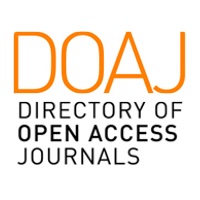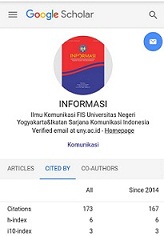Communication patterns in Javanese families to build family resilience in the digital era
DOI:
https://doi.org/10.21831/informasi.v54i1.71431Keywords:
communication patterns, Javanese families, family resilience, digital eraAbstract
This study aims to find communication patterns in Javanese families to build family resilience in the digital era. This study used qualitative research methods of phenomenological studies. The subjects in the study were determined through purposive sampling, namely 5 families in Yogyakarta, Indonesia. The collection of research data uses in-depth interviews and observations, while data analysis is through Interpretative Phenomenological Analysis. The results of this study are as follows: Communication patterns for Javanese families in the digital era through a) parents as role models through setting examples in increasing spirituality and positive habituation, parents need to have responsive Digital skills. Family resilience patterns in childcare in the digital era need to be built by: a) building humanist dialogue, respecting each other, listening and responding to each other, making comfortable not depressed and afraid in the process then this is a process that can be developed in families in the digital age. b) democratic-contextual, in facing challenges and crises in the family, parents also need to develop a democratic parenting style that suits the needs of each child.
References
Aslan, A. (2019). Peran Pola Asuh Orangtua di Era Digital. Jurnal Studia Insania, 7(1), 20. https://doi.org/10.18592/jsi.v7i1.2269
Astiyanto, H. (2006). Filsafat Jawa: menggali butir-butir kearifan lokal. Warta Pustaka. https://books.google.co.id/books?id=KJ_XAAAAMAAJ
Black, K., & Lobo, M. (2008). A conceptual review of family resilience factors. Journal of Family Nursing, 14(1), 33–55.
Christine W.S., Megawati Oktorina, & Indah Mula. (2010). Pengaruh Konflik Pekerjaan dan Konflik Keluarga Terhadap Kinerja dengan Konflik Pekerjaan Keluarga Sebagai Intervening Variabel (Studi pada Dual Career Couple di Jabodetabek). Jurnal Manajemen Dan Kewirausahaan, 12(2), pp.121-132. http://puslit2.petra.ac.id/ejournal/index.php/man/article/view/18170
Daeng, N. R. (2022). Perbedaan Kepuasan Pernikahan antara Suami dan Istri dalam Dual Career Family. Jurnal Persepsi Psikologi, 5(1), 41-49.
Geertz, Hildred. (1983). Keluarga Jawa. Jakarta: Grafiti Pers (original work published 1961).
Geertz, H. (1961). The Javanese family: a study of kinship and socialization. Free Press of Glencoe. https://ehrafworldcultures.yale.edu/document?id=oe05-020
Goode, W. J. (1993). The Family (Sosiologi Keluarga). Terj:(Jakarta: Bumi Aksara, 2002).
Hidayati, L. (2016). Model Pengasuhan Alternatif Pada Dual-Career Family: Pemenuhan Kebutuhan Asah, Asih, dan Asuh Anak Pada Keluarga Ayah-Ibu Bekerja di Kabupaten Tuban. Al-Athfal: Jurnal Pendidikan Anak, 2(2), 41-54.
Kalil, A., Development, N. Zealand. M. of S., & Evaluation, N. Zealand. M. of S. Development. C. for S. R. and. (2003). Family Resilience and Good Child Outcomes: A Review of the Literature. Ministry of Social Development, Centre for Social Research and Evaluation. https://books.google.co.id/books?id=_dtUAAAACAAJ
Ki Hadjar Dewantara. (2013). Part One: Education. Yogyakarta: Majelis Luhur Persatuan Taman Siswa.
Lucchini, M., Saraceno, C., & Schizzerotto, A. (2007). Dual-earner and dual-career couples in contemporary Italy. Journal of Family Research, 19(3), 290–310. https://doi.org/10.20377/jfr-283
Lutfia, S & Kinanthi, M, R. (2016). Job Stress And Marital Satisfaction Among Husband in Dual-Earner Marriages. Proceedings on Social Science and Humanities, 1.
Luthar, S. S., Cicchetti, D., & Becker, B. (2000). The construct of resilience: A critical evaluation and guidelines for future work. Child Development, 71(3), 543–562. https://doi.org/10.1111/1467-8624.00164
Mackay, F. (2004). Gender and political representation in the UK: The state of the "˜discipline.' The British Journal of Politics and International Relations, 6(1), 99–120.
Magnis-Suseno, F. (2003). Etika Jawa: sebuah analisa falsafi tentang kebijaksanaan hidup Jawa. Gramedia Pustaka Utama. https://books.google.co.id/books?id=_qnkngEACAAJ
Mardimin, Y. (1994). Jangan tangisi tradisi: transformasi budaya menuju masyarakat Indonesia modern. Kanisius. https://books.google.co.id/books?id=pLxqAAAACAAJ
Mulder, C. H. (2007). Choice: a Challenge for New Research. Population, Space and Place, 13(April), 265–278.
Mullin, W. J., & Arce, M. (2008). Resilience of families living in poverty. Journal of Family Social Work, 11(4), 424–440. https://doi.org/10.1080/10522150802424565
Nichols, W. C. (2013). Roads to understanding family resilience: 1920s to the twenty-first century. In In D.S. Becvar (ed). Handbook of family resilience. New York: Springer Science. Business Media Handbook of Family Resilience. (2013). Britania Raya: Springer New York.
Patterson, J. M. (2002). Understanding family resilience. Journal of Clinical Psychology, 58(3), 233–246. https://doi.org/10.1002/jclp.10019
Patterson, J. M. (2002). Integrating Family resilience and family stress theory. Journal of Marriage and Family, 64, 349-360.
Patterson, J. M. (2002). Understanding family resilience. Journal of clinical Psychology, 58(3), 233-246.
Rahmatika, N. S., & Handayani, M. M. (2012). Hubungan antara bentuk strategi coping dengan komitmen perkawinan pada pasangan dewasa madya dual karir. Jurnal Psikologi Pendidikan Dan Perkembangan, 1(3), 1–8. http://www.journal.unair.ac.id/filerPDF/110911153_Ringkasan.pdf
Ritzer, G. (1980). Sociology: A Multiple Paradigm Science. Allyn and Bacon. https://books.google.co.id/books?id=8rawAAAAIAAJ
Ritzer, G. (2009). Sociology: A Science with Dual Paradigms. Jakarta: Rajawali Press
Sixbey, M. T. (2005). Development of the family resilience assessment scale to identify family resilience constructs. University of Florida.
Soekanto, S. (2004). Sociology of the Family (About the family, and children). Jakarta: CV. Rajawali.
Suseno, F. M. (1984). Javanese Ethics: A Philosophical Analysis of Javanese Life Wisdom. Jakarta (ID): Gramedia Pustaka Utama.
Sumodiningrat, G., Wiwoho, B., Basri, H., & Jatnika, Y. (1998). Kepemimpinan Jawa: falsafah dan aktualisasi. Bina Rena Pariwara. https://books.google.co.id/books?id=F89bAgAACAAJ
Suseno. (2013). Etika Jawa. Skripsi Etika Jawa, 1987, 1.
Walsh, F. (2015). Strengthening Family Resilience, Third Edition. Guilford Publications. https://books.google.co.id/books?id=RY1_CgAAQBAJ
Walsh, F. (2006). Strengthening Family Resilience (third edition). New York: The Guilford Press.
Walsh, F. (1996). The concept of family resilience: Crisis and challenge. Fam Proc 35: 261-281. doi: http://10.1111/j.1545-5300.1996.00261.x
Walsh, F. (2002). A family resilience framework: Innovative practice aplication. Family Relations, Vol. 51, No. 2, 130-137. doi: http://dx.doi.org/10.1111/j.1741-3729.2002.00130.x
Walsh, F. (2003). Family resilience: A framework for clinical practice. Family Process, 42(1), 1-18. doi: https://doi.org/10.1111/j.1545-5300.2003.00001.x
Walsh, F. (2006). Strengthening Family Resilience 2nd Edition. New York: The Guilford Press.
Walsh, F. (2007). Traumatic loss and major disasters: Strengthening family and community resilience. Family Process, 46(2), 207. doi: https://doi.org/10.1111/j.1545-5300.2007.00205.x
Walsh, F. (2012). Strengthening family resilience: Overcoming life challenges. In Scabini, E., & Rossi, G. (eds.). Family Transitions and Families in Transition. Milan: Centre for Studies and Research on the Family, Catholic University of the Sacred HeartAslan, A. (2019). Peran Pola Asuh Orangtua di Era Digital. Jurnal Studia Insania, 7(1), 20. https://doi.org/10.18592/jsi.v7i1.2269
Downloads
Published
Issue
Section
License
Authors who publish with this journal agree to the following terms:- Authors retain copyright and grant the journal right of first publication with the work simultaneously licensed under a Creative Commons Attribution License that allows others to share the work with an acknowledgement of the work's authorship and initial publication in this journal.
- Authors are able to enter into separate, additional contractual arrangements for the non-exclusive distribution of the journal's published version of the work (e.g., post it to an institutional repository or publish it in a book), with an acknowledgement of its initial publication in this journal.
- Authors are permitted and encouraged to post their work online (e.g., in institutional repositories or on their website) prior to and during the submission process, as it can lead to productive exchanges, as well as earlier and greater citation of published work (See The Effect of Open Access).




















